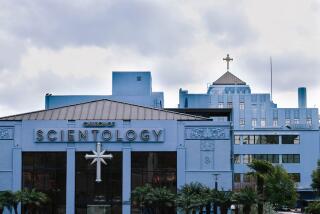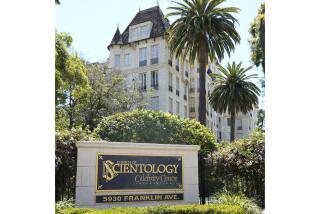Supreme Court Turns Down Scientology Plea : Way Cleared for Former Member to Start Seizing Church Assets to Satisfy Award of $30 Million
The Supreme Court on Monday rebuffed pleas by the Church of Scientology of California for relief from having to post a bond of up to $60 million to guard its assets against seizure while it appeals a huge Los Angeles jury award.
Scientology lawyers have argued that payment of the bond would plunge the church into bankruptcy. But the state court judge who presided over the jury trial contends that the controversial organizationâs claims of poverty are untrue.
The Supreme Courtâs decision clears the way for former Scientologist Larry Wollersheim to begin seizing church assets to satisfy a $30-million award he won last year.
Wollersheim, who contended that the church harassed him and drove him to the brink of insanity, was awarded $5 million in compensatory damages and $25 million in punitive damages by the Los Angeles Superior Court jury.
Church Appealed Verdict
The church has appealed the verdict. But under California law, a losing litigant must post a cash bond of twice the amount of the award or a surety bond costing 1 1/2 times the award to avoid paying a judgment while an appeal is under way.
In October, the high court temporarily granted the Church of Scientology of Californiaâs plea to stay posting of the bond. But on Monday the justices vacated the stay and rejected the churchâs appeal without comment.
Mondayâs action followed by two weeks a Supreme Court ruling in a similar case from Texas involving Texacoâs effort to avoid posting an $11-billion bond before it could appeal a judgment won by Pennzoil. The court, however, did not rule on the constitutionality of the bond requirement, declaring instead that the Texaco case should not have been in federal court while state court remedies were still available.
Lost Issue in State Courts
The Church of Scientology has already lost the issue in the California courts.
In legal papers seeking to have the bond requirement voided, church attorney Leonard P. Boudin had argued that Scientology âwill be severely crippled or destroyed by a judgment of questionable constitutionalityâ since the organizationâs net worth is only $13 million.
The churchâs claims of imminent financial ruin, however, have been disputed by Wollersheimâs attorneys and by Los Angeles Superior Court Judge Ronald E. Swearinger, who presided over the trial.
In a strongly worded opinion last September, Swearinger said âthe claim of relative indigency is not believed by the court, and the court has had ample opportunity to examine and consider the credibility of the defendant during 5 1/2 months of trial and extended post-trial proceedings.â
Swearinger said Scientology is composed of interconnected entities, including the California church, which form a âmonolithic whole.â Swearinger said the Church of Scientology of California transferred âvirtually all of its assets and functionsâ to those other entities between the time Wollersheim filed his lawsuit in 1980 and the start of the trial in February, 1986.
The transfers, Swearinger said, âare seen as mere âjiggery-pokery (deception).â The power to transfer out to a sister entity is the power to transfer back in âwhen the heat is off,â so to speak.â
Moreover, Swearinger characterized as âpure shamâ arguments by the church that the bond would deprive its parishioners of the right to practice their religion.
âProof has shown that the real estate, furnishings, fixtures and stock in trade of Scientology are in possession and control of other Scientology entities,â the judge said, adding that the Church of Scientology of California âis merely a shadow of its former self. . . . â
âWe Donât Have $60 Millionâ
Reacting to the Supreme Court ruling, church attorney John Peterson said Monday that the church will not post the bond.
âWeâve made it clear that we donât have the $60 million,â Peterson said, emphasizing that the church is nonetheless pressing ahead with its state court appeal of the Wollersheim verdict.
Peterson said the church will consider further litigation should Wollersheimâs lawyers move to seize church assets.
Neither Wollersheim nor his attorneys could be reached for comment.
As for Swearingerâs September ruling, Peterson said the judge âdoesnât know what heâs talking about.â The transfers of assets and responsibilities from the California church to other Scientology entities, Peterson said, were done openly and lawfully.
âAny asset that was put into another corporation, there was value received for itâ by the Church of Scientology of California, Peterson said.
2 Months of Demonstrations
Last yearâs jury verdict of $30 million to Wollersheim prompted nearly two months of demonstrations in the Los Angeles Civic Center by Scientologists from around the world. They contended that their religion was being unconstitutionally attacked in courtrooms across the land.
Wollersheim said in his suit that he was âpsychologically manipulatedâ and robbed of his independent judgment through a church practice known as auditing. During auditing, an individual is asked to reveal intimate details of his life while his responses are monitored for veracity on a lie-detector device known as an E-meter.
Under Scientology doctrine, an individual will unburden himself of negative experiences during an auditing session, thus freeing himself to achieve his full potential.
But Wollersheim said auditing caused him severe mental stress, and that the church failed to provide him with professional psychological help. He said he must now take lithium to control erratic mood swings.
Wollersheim also claimed that, after he criticized the group, the church drove his novelty wares business into bankruptcy by ordering Scientologists to boycott his products, to quit working for him and to refuse to repay money owed to him.
The Wollersheim lawsuit was but one of dozens filed against Scientology by disaffected ex-members, who charged that they had been defrauded and harassed by the organization. Scientology late last year paid millions of dollars to rid itself of virtually all of that litigation.
In a December interview with The Times, a church lawyer insisted that Scientology would not âpay a dime by order of the court in the Wollersheim case.â He said âthat case will be litigated as long as it takes.â
But Peterson said Monday, âWe are always amenable to talking settlement.â
Also pending is a $1-billion class-action suit filed in December against Scientology and its leaders by an organization claiming to represent 400 ex-members of the church. Among other things, the suit accuses certain organization officials of plundering church coffers.
Scientology was founded in the early 1950s by the late science-fiction writer L. Ron Hubbard.
The organization has been accused by its critics of harassing opponents and of running a business under the guise of a religion.
In 1980, 11 Scientologists--including Hubbardâs third wife--were convicted of burglarizing and infiltrating U.S. government offices. In 1984, the Church of Scientology of California had its tax-exempt status revoked by the the U.S. Tax Court for operating in a commercial fashion.
This story was reported by David G. Savage in Washington and Joel Sappell in Los Angeles.
More to Read
Sign up for Essential California
The most important California stories and recommendations in your inbox every morning.
You may occasionally receive promotional content from the Los Angeles Times.











